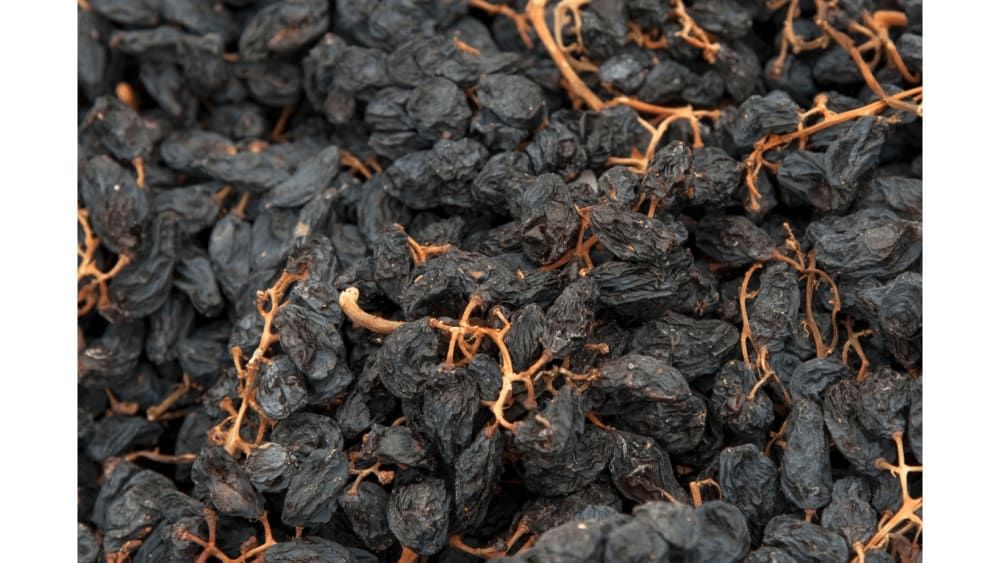Raisin (Kishmish) Water: Uses, Benefits, Side Effects
Raisins have dietary fiber that gives you the feeling of being full. Half a cup of raisins may contain about 3.3 grams of fibre. Hence, you may eat fewer calories, which may lead to weight loss.

Raisins have vitamins that can benefit you in many ways. Find ways to make raisin water easily at home and top benefits you can unlock by drinking it every morning.
Raisin Water Meaning
Raisins refer to a type of grapes that have been dried for about three weeks. One typically dries them under direct sunlight, on paper trays or in vineyards. Raisin water meaning refers to when raisins are soaked in or strained from water.
How to consume soaked raisin water?
Consuming raisin water has multiple health benefits.
But what about raisin water preparation?
To prepare raisin water, follow these simple steps:
- Take 150 grams of raisin and soak it in 2 cups of water.
- Leave this mixture overnight.
- Strain it the following morning and consume it on an empty stomach.
Also read: Top Jeera Water benefits you didn't know about

Top Benefits of Raisins Soaked in Water
Raisin Water Benefits for Skin
- Raisins contain antioxidants that are known to repair cellular damage. They keep the skin clean, hydrated and make you feel rejuvenated.
- They also protect skin cells against damaging effects and may help delay premature aging signs such as wrinkles, blemishes, fine lines, age spots, etc.
- Thanks to the high content of Vitamins A & E, your skin gets nourished from the inside out.
- The amino acids and phytochemicals in raisins act as a protective barrier for your skin against excessive sun exposure.
- The resveratrol content in raisins may help detoxify the blood and boost the production of red blood cells. It helps your skin to have a clear and glowing look.
- As raisins are full of dietary fibre and Vitamin C, it keeps your digestive system active and provides valuable nutrients to your skin. This may help keep acne away.

Raisin Water for Weight Loss
- Raisins have dietary fibre that gives you the feeling of being full. Half a cup of raisins may contain about 3.3 grams of fibre. Hence, you may eat fewer calories, which may lead to weight loss.
- Another advantage of dietary fibre is that it regulates bowel movements. This helps flush out waste from your body.
- The natural sugars present in raisins act as an appetite suppressant to help you satiate your sweet cravings. This will help maintain blood sugar levels and lead to weight loss.
- This dried fruit works like prebiotics that improves the growth of gut flora which is essential for weight loss.
- Studies also state that consuming raisins daily records a 39% lower obesity risk and 54% lesser risk of metabolic syndrome.

Raisin Water for Acne
Raisins contain high levels of potassium and magnesium. This may neutralize the stomach acid by preventing "Acidosis", which is the toxicity of the blood. Due to this, several skin issues such as pimples and boils get treated, making your skin clearer.
As raisins have dietary fibre that helps digestion, it helps prevent unnecessary toxins from your body and keeps acne problems at bay.
Additional Benefits of Raisin water:
- Apart from detoxifying your blood and flushing out harmful toxins, drinking raising water (made with organic raisins) improves the biochemical processes of the liver.
- Raisins are known to balance blood pressure through their rich potassium content. This is because potassium counters the effects of sodium (salt).
- This dried fruit also has Vitamins B, C and antioxidants. It helps in improving your body's natural immune response.
- One hundred gms of raisin has 50mg of calcium and minerals like phosphorus & boron. Regular consumption of raisin water absorbs these nutrients and helps improve teeth strength and bone mineral density.
- Iron present in raisins boosts the production of red blood cells (RBCs). This helps in preventing anemia.
- Melatonin is a compound present in this dried fruit known to improve sleep quality. Compounds like L' Theanine for anxiety and sleep also have the same purpose.
- The phytonutrients present in black raisins help improve ocular health. This leads to improvement in vision.

Raisin Water Recipe
Find out how to make raisin water correctly by following the simple steps below:
· Rinse the raisins in running water for a couple of minutes.
· Add the washed raisins to a cup/glass of drinking water.
· Let the raisins soak overnight.
· Wake up the following day, strain the raisin water and drink it.
· You can add up to 150 grams of raisins in 1 or 2 glasses.
When to have it?
Ideally, the best time for drinking raisin water is early morning on an empty stomach.
Black raisin water
Black raisin water has immense benefits for women, including assisting conception, infertility issues, and conditions such as PCOS.
Raisin Water Side Effects
Some of the side effects of drinking raisin water are:
Commercially grown raisins
These may contain small traces of pesticides that might reduce energy production in your cells.
Bleaching and adding chemicals
Raisins are treated with sulfur dioxide and bleached to show fresh, bright colours and increase their shelf life. This impacts patients who are sulfate-sensitive and have asthma.
Also read: What is Isabgol? Benefits and side effects
Extra calorie intake
One hundred gms of raisins contain about 300 calories. While a single raisin has the same number of calories as a single grape, you might have more of it due to its small size. This leads to eating too many calories at a time.
Gastrointestinal issues
Eating too many raisins might increase the soluble fibre in your body. Research suggests too much fibre will lead to gastrointestinal issues such as bloating, gas, and cramps.
References
James M. Lattimer, Mark D. Haub (2010) Effects of Dietary Fiber and Its Components on Metabolic Health (U.S. National Library of Medicine) https://www.ncbi.nlm.nih.gov/pmc/articles/PMC3257631/
Magdy El-Salhy, Synne Otterasen Ystad (2017) Dietary fiber in irritable bowel syndrome (Review) (International Journal of Molecular Medicine) https://www.ncbi.nlm.nih.gov/pmc/articles/PMC5548066/
Victor L. Fulgoni, III ,James Painter (2017) Association of raisin consumption with nutrient intake, diet quality, and health risk factors in US adults: National Health and Nutrition Examination Survey 2001–2012 (U.S. National Library of Medicine) https://www.ncbi.nlm.nih.gov/pmc/articles/PMC5642187/
Jane McDonald, Diane Pirhonen (1983) High Fiber Diets: Their Role in Gastrointestinal Disorders (U.S. National Library of Medicine) https://www.ncbi.nlm.nih.gov/pmc/articles/PMC2153876/
